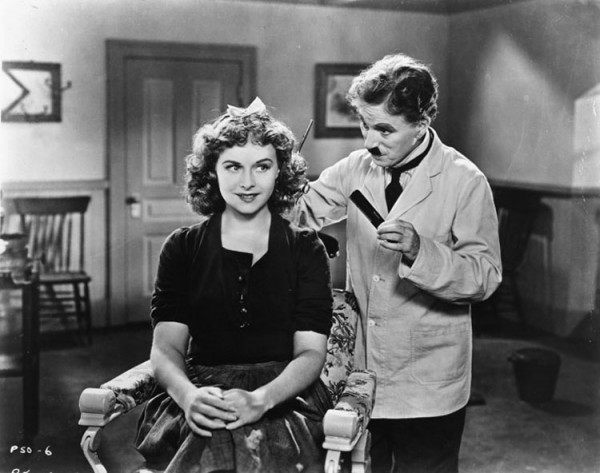
Paulette Goddard and Charlie Chaplin take on the Third Reich in his first talkie, THE GREAT DICTATOR
THE GREAT DICTATOR (Charles Chaplin, 1940)
BAMcinématek, BAM Rose Cinemas
30 Lafayette Ave. between Ashland Pl. & St. Felix St. Sunday, August 11, 2:00, 4:30, 7:00, 9:30
718-636-4100
www.bam.org
 Learning of many of the horrible things the Third Reich was doing, Charlie Chaplin could not hold his tongue anymore, finally making his first talking picture in 1940. In The Great Dictator, writer-director-producer Chaplin unrelentingly mocks Adolf Hitler and the rise of the Nazis in Germany, albeit with a very serious edge, as WWII threatens. Chaplin plays the dual roles of a simple Jewish barber living in the ghetto (who has elements of the Little Tramp) and Adenoid Hinkle, the rather Hitler-esque Fascist leader of the country of Tomania. Just as he named the nation after a foodborne illness (ptomaine poisoning), Chaplin does not go for subtlety in the film; his right-hand man is Herr Garbitsch (Henry Daniel spoofing Nazi Minister of Propaganda Joseph Goebbels), and his military mastermind is Field Marshal Herring (Billy Gilbert making fun of Heinrich Himmler). Chaplin plays Hinkle like a cartoon character, with pratfalls galore, and when he speaks in German, especially when he gives a major speech, he spits out fake German words with a smattering of funny English ones. When he learns that Benzino Napaloni (Jack Oakie as a melding of Benito Mussolini and Napoleon Bonaparte) has gathered his troops on the Osterlitz border (think Anschluss), Hinkle invites the Bacteria dictator to his Tomanian palace, where they engage in numerous hysterical bouts of one-upmanship, including a riotous battle involving barber chairs. Meanwhile, Chaplin performs another of the film’s most memorable scenes, the shave of an old man set to Brahms’s “Hungarian Dance No. 5.” But when Commander Schultz (Reginald Gardiner) leaves the Nazi regime and decides to help the Jewish people in the ghetto, Hinkle sends his stormtroopers out to find the traitor, leading to a major case of mistaken identity and a heartfelt, if overly melodramatic, finale. In addition, Chaplin’s lover at the time, Paulette Goddard, plays Hannah (named for Chaplin’s mother), a young Jewish woman living in the ghetto, and Bowery Boys fans will recognize Bernard Gorcey, who played sweet-shop owner Louie Dombrowski in the goofy film series, as Mr. Mann.
Learning of many of the horrible things the Third Reich was doing, Charlie Chaplin could not hold his tongue anymore, finally making his first talking picture in 1940. In The Great Dictator, writer-director-producer Chaplin unrelentingly mocks Adolf Hitler and the rise of the Nazis in Germany, albeit with a very serious edge, as WWII threatens. Chaplin plays the dual roles of a simple Jewish barber living in the ghetto (who has elements of the Little Tramp) and Adenoid Hinkle, the rather Hitler-esque Fascist leader of the country of Tomania. Just as he named the nation after a foodborne illness (ptomaine poisoning), Chaplin does not go for subtlety in the film; his right-hand man is Herr Garbitsch (Henry Daniel spoofing Nazi Minister of Propaganda Joseph Goebbels), and his military mastermind is Field Marshal Herring (Billy Gilbert making fun of Heinrich Himmler). Chaplin plays Hinkle like a cartoon character, with pratfalls galore, and when he speaks in German, especially when he gives a major speech, he spits out fake German words with a smattering of funny English ones. When he learns that Benzino Napaloni (Jack Oakie as a melding of Benito Mussolini and Napoleon Bonaparte) has gathered his troops on the Osterlitz border (think Anschluss), Hinkle invites the Bacteria dictator to his Tomanian palace, where they engage in numerous hysterical bouts of one-upmanship, including a riotous battle involving barber chairs. Meanwhile, Chaplin performs another of the film’s most memorable scenes, the shave of an old man set to Brahms’s “Hungarian Dance No. 5.” But when Commander Schultz (Reginald Gardiner) leaves the Nazi regime and decides to help the Jewish people in the ghetto, Hinkle sends his stormtroopers out to find the traitor, leading to a major case of mistaken identity and a heartfelt, if overly melodramatic, finale. In addition, Chaplin’s lover at the time, Paulette Goddard, plays Hannah (named for Chaplin’s mother), a young Jewish woman living in the ghetto, and Bowery Boys fans will recognize Bernard Gorcey, who played sweet-shop owner Louie Dombrowski in the goofy film series, as Mr. Mann.
The Great Dictator is filled with marvelous moments, from Hinkle dancing with a balloon globe to several of the Jews in the ghetto trying to hide in the same chest, but the film does suffer from pedagoguery in making its political points, and some of the slapstick is too lowbrow. Nominated for five Oscars, it falls somewhere between the Marx Brothers’ Duck Soup (1933) and the Three Stooges’ You Nazty Spy! (1940) while also referencing the 1921 silent film King, Queen, Joker, in which Chaplin’s older half-brother, Sidney (who also directed), played the dual role of a modest barber and the king of the fictional Coronia. A seminal achievement that was supposedly seen by Hitler twice, The Great Dictator is screening August 11 as part of the BAMcinématek series “Chaplin in 35mm,” which concludes August 12 with A King in New York.
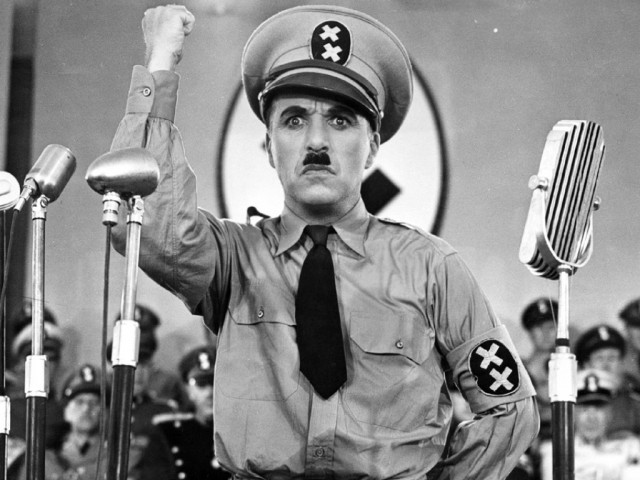
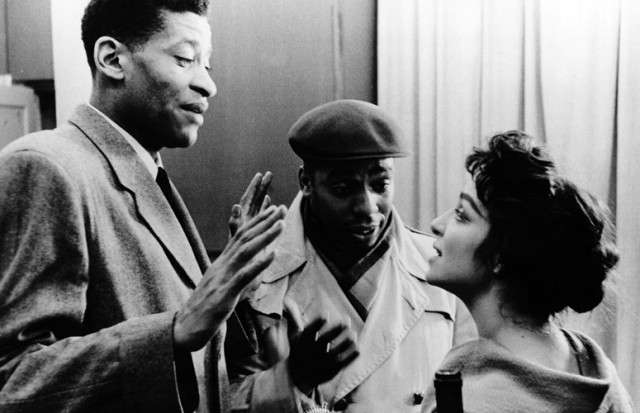
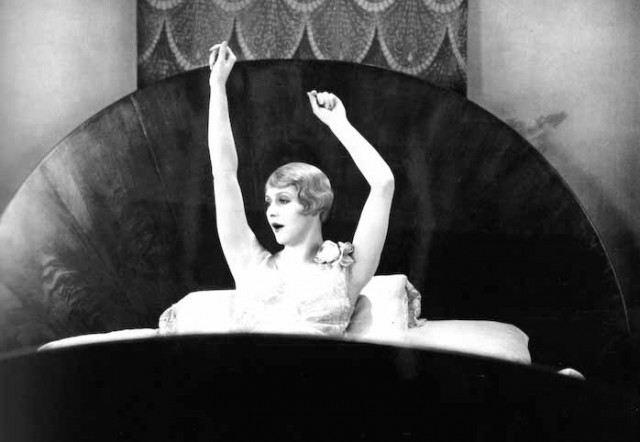
 Loosely based on a Noël Coward play that was recently made into a film starring Colin Firth, Jessica Biel, and Kristin Scott Thomas, Alfred Hitchcock’s Easy Virtue is another of the Master of Suspense’s cleverly told melodramas, a risqué tale of a woman unfairly placed in a lurid situation. Isabel Jeans stars as Larita Filton, a loving wife whose husband, Aubrey (Franklin Dyall), has commissioned her portrait by painter Claude Robson (Eric Bransby Williams). Just as Claude makes a play for Larita, she fights him off and Aubrey walks in. He misinterprets the scene, shots ring out, the artist is dead, and Claude files a highly publicized divorce case in which Larita is found guilty of misconduct. Trying to put her notorious past behind her, she heads for the Mediterranean, where she meets John Whittaker (Robin Irvine), a wealthy mama’s boy who falls instantly in love with her and brings her back to his parents’ country estate. But once there, Whittaker’s nasty mother (Violet Farebrother) and conniving sisters (Dacia Deane and Dorothy Boyd) do everything they can to ruin the relationship, seeking to uncover Larita’s history while also attempting to put her son back together with longtime family friend Sarah (Enid Stamp Taylor). Easy Virtue, which features yet another Hitchcock blonde, is a gripping film about honesty, reputation, individuality, and character as an innocent woman is forced to face undeserved consequences in the superficial world of high society. Hitchcock, who makes his cameo holding a walking stick, gliding past Larita while she sits by a tennis court, includes several wonderful touches involving circles and ovals, from a close-up of a judge’s wig to a shot through a tennis racket’s strings to a dining room dominated by a group of elongated, haloed saints on one wall. Easy Virtue is also one of Hitchcock’s dourest silent melodramas, lacking any comic relief as a wronged woman desperately tries to right her life. A DCP restoration of Easy Virtue is being screened July 2 at 7:30 in the BAM Harvey Theater as part of “The Hitchcock 9,” with live piano music by Stephen Horne. The series continues through July 3 with such other rarely shown Hitchcock silents as The Farmer’s Wife, Downhill, Champagne, and The Pleasure Garden, Sir Alfred’s debut, which has been restored with an additional twenty minutes that have been missing since its initial release.
Loosely based on a Noël Coward play that was recently made into a film starring Colin Firth, Jessica Biel, and Kristin Scott Thomas, Alfred Hitchcock’s Easy Virtue is another of the Master of Suspense’s cleverly told melodramas, a risqué tale of a woman unfairly placed in a lurid situation. Isabel Jeans stars as Larita Filton, a loving wife whose husband, Aubrey (Franklin Dyall), has commissioned her portrait by painter Claude Robson (Eric Bransby Williams). Just as Claude makes a play for Larita, she fights him off and Aubrey walks in. He misinterprets the scene, shots ring out, the artist is dead, and Claude files a highly publicized divorce case in which Larita is found guilty of misconduct. Trying to put her notorious past behind her, she heads for the Mediterranean, where she meets John Whittaker (Robin Irvine), a wealthy mama’s boy who falls instantly in love with her and brings her back to his parents’ country estate. But once there, Whittaker’s nasty mother (Violet Farebrother) and conniving sisters (Dacia Deane and Dorothy Boyd) do everything they can to ruin the relationship, seeking to uncover Larita’s history while also attempting to put her son back together with longtime family friend Sarah (Enid Stamp Taylor). Easy Virtue, which features yet another Hitchcock blonde, is a gripping film about honesty, reputation, individuality, and character as an innocent woman is forced to face undeserved consequences in the superficial world of high society. Hitchcock, who makes his cameo holding a walking stick, gliding past Larita while she sits by a tennis court, includes several wonderful touches involving circles and ovals, from a close-up of a judge’s wig to a shot through a tennis racket’s strings to a dining room dominated by a group of elongated, haloed saints on one wall. Easy Virtue is also one of Hitchcock’s dourest silent melodramas, lacking any comic relief as a wronged woman desperately tries to right her life. A DCP restoration of Easy Virtue is being screened July 2 at 7:30 in the BAM Harvey Theater as part of “The Hitchcock 9,” with live piano music by Stephen Horne. The series continues through July 3 with such other rarely shown Hitchcock silents as The Farmer’s Wife, Downhill, Champagne, and The Pleasure Garden, Sir Alfred’s debut, which has been restored with an additional twenty minutes that have been missing since its initial release.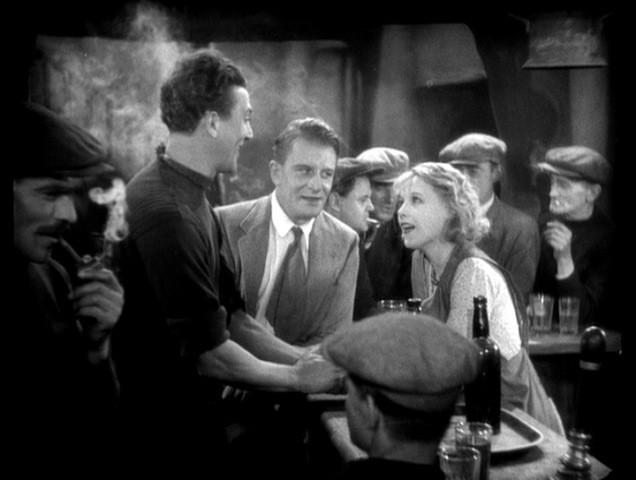
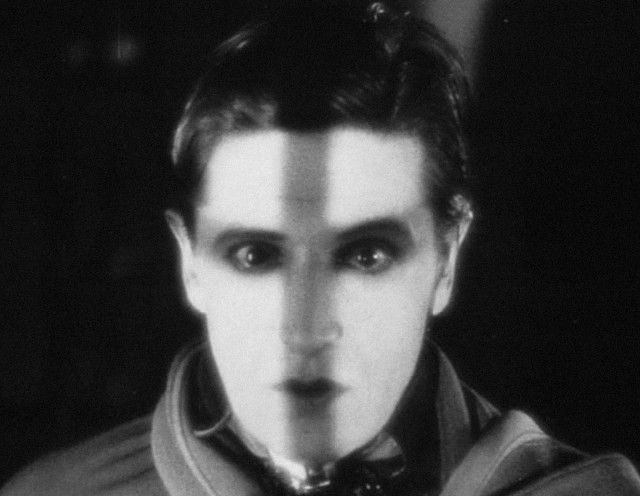
 For seven successive Tuesday nights, a serial killer who calls himself the Avenger has murdered a golden-haired woman. When a lodger (Ivor Novello) comes to rent a room from Mr. and Mrs. Bunting (Arthur Chesney and Marie Ault), the landlady soon suspects that the curious character might just be the murderer, especially when he shows an interest in their daughter, a golden-haired fashion model named Daisy (the one-named June), which angers Daisy’s beau, Joe (Malcolm Keen), a cop just assigned to the case. Based on a novel and play by Marie Belloc Lowndes, The Lodger is one of Alfred Hitchcock’s first films; he uses very few title cards in the silent work, allowing the story to tell itself. He serves up a heavy dose of red herrings in the Jack the Ripper-like tale, which drags on for quite a bit before shifting gears in the later scenes. The mediocre picture is most notable for the groundwork it lays for Hitchcock’s future films, investigating such themes as sexual obsession and innocent men on the run while displaying the director’s never-ending — and rather frightening — cinematic relationship with blondes. A DCP restoration of The Lodger is being screened June 30 at 7:30 in the BAM Harvey Theater as part of “The Hitchcock 9,” with live music by the Mont Alto Motion Picture Orchestra. The series continues through July 3 with such other rarely shown Hitchcock silents as The Manxman, The Pleasure Garden, Downhill, and Champagne.
For seven successive Tuesday nights, a serial killer who calls himself the Avenger has murdered a golden-haired woman. When a lodger (Ivor Novello) comes to rent a room from Mr. and Mrs. Bunting (Arthur Chesney and Marie Ault), the landlady soon suspects that the curious character might just be the murderer, especially when he shows an interest in their daughter, a golden-haired fashion model named Daisy (the one-named June), which angers Daisy’s beau, Joe (Malcolm Keen), a cop just assigned to the case. Based on a novel and play by Marie Belloc Lowndes, The Lodger is one of Alfred Hitchcock’s first films; he uses very few title cards in the silent work, allowing the story to tell itself. He serves up a heavy dose of red herrings in the Jack the Ripper-like tale, which drags on for quite a bit before shifting gears in the later scenes. The mediocre picture is most notable for the groundwork it lays for Hitchcock’s future films, investigating such themes as sexual obsession and innocent men on the run while displaying the director’s never-ending — and rather frightening — cinematic relationship with blondes. A DCP restoration of The Lodger is being screened June 30 at 7:30 in the BAM Harvey Theater as part of “The Hitchcock 9,” with live music by the Mont Alto Motion Picture Orchestra. The series continues through July 3 with such other rarely shown Hitchcock silents as The Manxman, The Pleasure Garden, Downhill, and Champagne. Based on the play by Charles Bennett, Alfred Hitchcock’s 1929 thriller, Blackmail, is both his last silent picture as well as his first sound film. The transition is evident from the very beginning, eight glorious minutes of a police arrest with incidental music only, highlighted by an unforgettable mirror shot (courtesy of cinematographer Jack E. Cox) as the cops close in on their suspect. After those opening moments, the film switches to a talkie in the nonsilent version, as New Scotland Yard detective Frank Webber (John Longden) gets into a fight with his girlfriend, Alice White (Anny Ondra, later to become the longtime Mrs. Max Schmeling), who goes off on a secret rendezvous with a slick artist named Crewe (Cyril Ritchard). When things go horribly wrong at Crewe’s studio, Frank assures Alice that he will help her, but slimy ex-con Tracy (Donald Calthrop) has other ideas, thinking he can use some inside information to make a small killing. After shooting the picture with sound — including having Ondra’s dialogue spoken off-screen by Joan Barry because Ondra’s Eastern European accent was too thick — Sir Alfred filmed some scenes over again in silence, resulting in two versions of this splendid psychological thriller, both laced with elements of German Expressionism and early film noir as well as flashes of Edgar Allan Poe’s “The Tell-Tale Heart” and Fyodor Dostoyevsky’s Crime and Punishment. Look for the Master of Suspense as the man on the subway being menaced by a young boy. A DCP restoration of the silent version of Blackmail is being screened June 29 at 7:30 in the BAM Harvey Theater as part of “The Hitchcock 9,” with live music by the Mont Alto Motion Picture Orchestra. The series continues through July 3 with such other rarely shown Hitchcock silents as The Manxman, The Pleasure Garden, Downhill, and Champagne.
Based on the play by Charles Bennett, Alfred Hitchcock’s 1929 thriller, Blackmail, is both his last silent picture as well as his first sound film. The transition is evident from the very beginning, eight glorious minutes of a police arrest with incidental music only, highlighted by an unforgettable mirror shot (courtesy of cinematographer Jack E. Cox) as the cops close in on their suspect. After those opening moments, the film switches to a talkie in the nonsilent version, as New Scotland Yard detective Frank Webber (John Longden) gets into a fight with his girlfriend, Alice White (Anny Ondra, later to become the longtime Mrs. Max Schmeling), who goes off on a secret rendezvous with a slick artist named Crewe (Cyril Ritchard). When things go horribly wrong at Crewe’s studio, Frank assures Alice that he will help her, but slimy ex-con Tracy (Donald Calthrop) has other ideas, thinking he can use some inside information to make a small killing. After shooting the picture with sound — including having Ondra’s dialogue spoken off-screen by Joan Barry because Ondra’s Eastern European accent was too thick — Sir Alfred filmed some scenes over again in silence, resulting in two versions of this splendid psychological thriller, both laced with elements of German Expressionism and early film noir as well as flashes of Edgar Allan Poe’s “The Tell-Tale Heart” and Fyodor Dostoyevsky’s Crime and Punishment. Look for the Master of Suspense as the man on the subway being menaced by a young boy. A DCP restoration of the silent version of Blackmail is being screened June 29 at 7:30 in the BAM Harvey Theater as part of “The Hitchcock 9,” with live music by the Mont Alto Motion Picture Orchestra. The series continues through July 3 with such other rarely shown Hitchcock silents as The Manxman, The Pleasure Garden, Downhill, and Champagne.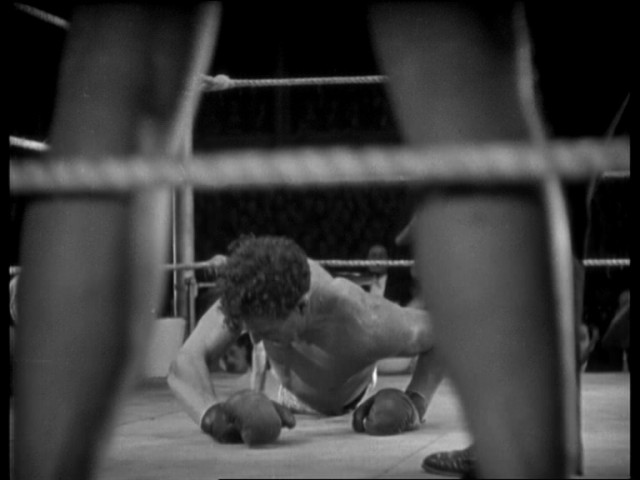
 When one thinks of Alfred Hitchcock, such psychological thrillers as North by Northwest, Psycho, Vertigo, Notorious, and Rear Window come to mind, not The Manxman, Easy Virtue, The Pleasure Garden, and The Farmer’s Wife. But it is these early, British silent films that are the focus of BAM’s exciting new series, “The Hitchcock 9.” The program runs June 29 through July 3 and features brand-new DCP restorations of nine romantic melodramas made by the Master of Suspense, each one shown in the Harvey Theater on the new Steinberg Screen, with live musical accompaniment. The series begins with 1927’s The Ring, a tantalizing tale of a love triangle set in the world of boxing, a favorite sport of Hitchcock’s. When Bob Corby (Ian Hunter) shows up at a county fair and takes a liking to Mabel (Lillian Hall-Davis), who sells tickets to see her fiance, “One-Round” Jack Sander (Carl Brisson), battle all comers for a cash prize, Corby decides to get in the ring with Sander to impress Mabel; little do they know that Corby is a professional. Soon the two men are also fighting outside the ring, to win the heart of their beloved. Comic relief is supplied by Gordon Harker as Jack’s trainer, who makes some very funny faces throughout. One can see Hitchcock’s visual style emerging in The Ring, as he employs little dialogue in favor of dramatic montages, ghostly superimpositions, and shadowy lighting. The film also deals with issues of class and financial success, themes that will become prevalent in much of Hitchcock’s work. Produced at Elstree Studios and the first film to be released by Gainsborough Pictures, The Ring will be screened at BAM on June 29 at 3:00, with a live score performed by the Mont Alto Motion Picture Orchestra.
When one thinks of Alfred Hitchcock, such psychological thrillers as North by Northwest, Psycho, Vertigo, Notorious, and Rear Window come to mind, not The Manxman, Easy Virtue, The Pleasure Garden, and The Farmer’s Wife. But it is these early, British silent films that are the focus of BAM’s exciting new series, “The Hitchcock 9.” The program runs June 29 through July 3 and features brand-new DCP restorations of nine romantic melodramas made by the Master of Suspense, each one shown in the Harvey Theater on the new Steinberg Screen, with live musical accompaniment. The series begins with 1927’s The Ring, a tantalizing tale of a love triangle set in the world of boxing, a favorite sport of Hitchcock’s. When Bob Corby (Ian Hunter) shows up at a county fair and takes a liking to Mabel (Lillian Hall-Davis), who sells tickets to see her fiance, “One-Round” Jack Sander (Carl Brisson), battle all comers for a cash prize, Corby decides to get in the ring with Sander to impress Mabel; little do they know that Corby is a professional. Soon the two men are also fighting outside the ring, to win the heart of their beloved. Comic relief is supplied by Gordon Harker as Jack’s trainer, who makes some very funny faces throughout. One can see Hitchcock’s visual style emerging in The Ring, as he employs little dialogue in favor of dramatic montages, ghostly superimpositions, and shadowy lighting. The film also deals with issues of class and financial success, themes that will become prevalent in much of Hitchcock’s work. Produced at Elstree Studios and the first film to be released by Gainsborough Pictures, The Ring will be screened at BAM on June 29 at 3:00, with a live score performed by the Mont Alto Motion Picture Orchestra.